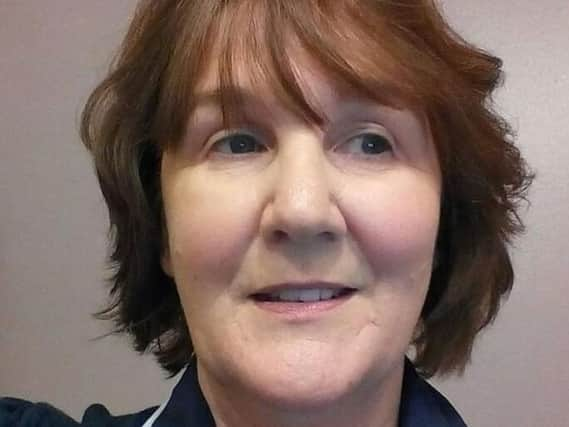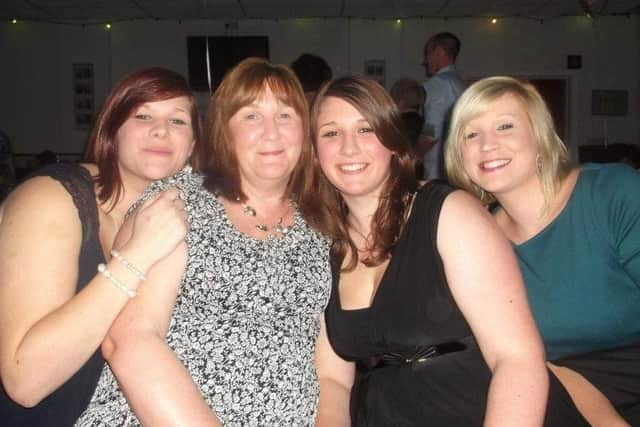Boston woman joins for call for action on brain tumour research after loss of her nurse mum


Shirley Clements lost her battle with the tumour earlier this year, and now daughter Kathryn Clements has joined a national fight calling for more to be done to help find out more about brain tumours.
Kathryn, a learning support assistant at Boston College, is among more than 112,000 people who have now signed a petition set up the charity Brain Tumour Research.
Advertisement
Hide AdAdvertisement
Hide AdIt is believed Shirley’s tumour may have been growing for years but hadn’t shown symptoms typical of a brain tumour.


The charity petition calls for increased investment in scientific research to bring funding on a level with that of other cancer charities, by introducing a new brain tumour research levelling up fund of £105 million and increasing the national investment into brain tumour research to £35 million a year
Retired nurse Shirley was all set to return to help tackle the Covid-19 pandemic, and had re-registered, having finished work in 2017.
Sadly, her illness meant she couldn’t fulfil her wish of going back to nursing, as she was taken ill last summer.
Advertisement
Hide AdAdvertisement
Hide AdKathryn said: “Mum re-registered as a nurse when the COVID-19 pandemic hit, as she wanted to go back and do her bit to help”
But before she could return, she started to suffer periods of feeling unwell and was diagnosed with an inner ear problem. Kathryn says they now know she actually had symptoms of a brain tumour.
She said: “One morning in July, without warning, Mum became disorientated, was vomiting and had lost her short-term memory. She was sent to hospital as her symptoms carried on for a few days.
“She had an MRI scan and the results showed a huge, inoperable tumour, which was already in various areas of her brain. It was suspected to have been growing for years with symptoms that were not typical of a brain tumour.”
Advertisement
Hide AdAdvertisement
Hide AdIn November 2020, Shirley embarked on 33 rounds of radiotherapy, which resulted in slight improvement, but further scans showed the tumour had continued to grow.
Kathryn added: “Mum had one round of chemotherapy and was due another, but on February 13, she woke in excruciating pain, begging my dad to help her. An ambulance was called and she was taken to hospital. A CT scan showed that there had been a break in the tumour and another had started to grow. There was nothing they could do for her.
“From that evening her care became palliative. She was transferred to a hospice, where, at 5:15pm on 23 February, she took her last breath and was finally free of this awful disease.”
A report circulated to MPs last week highlights the fact that brain tumours kill more children and adults under the age of 40 than any other cancer. It says that historically, just 1% of the national cancer spend has been allocated to this devastating disease.
Advertisement
Hide AdAdvertisement
Hide AdPrime Minister Boris Johnson has already confirmed he will receive the report from Derek Thomas, MP for St Ives. Speaking at Prime Minister’s Questions (Wednesday 24 March) the PM said he looked forward to meeting with Mr Thomas, who is Chairman of the All Party Parliamentary Group on Brain Tumours once it was “safe to do so.” The PM told the House of Commons that the Government had already promised an investment of £40 million but campaigners point out that, three years into the five-year period over which the funds had been promised, just £9 million has been allocated.
Sue Farrington Smith MBE, Chief Executive of Brain Tumour Research, said: “My sister’s little girl Alison Phelan was diagnosed with a brain stem glioma (DIPG) brain tumour in August 2000. Ten months later we lost her, in June 2001, three weeks before her eighth birthday.
“Twenty years on and the fate of adults and children diagnosed with these tumours has not improved - in fact the five-year survival rate has fallen to just 12%. What’s more, people diagnosed with low-grade tumours that become aggressive over time live with a ticking time bomb, not knowing if or when their tumour might become a lethal grade 4. In the meantime, they endure sometimes multiple surgeries, chemotherapy and radiation therapy. They can suffer changes in personality and more and more disabling impacts, and their loved ones’ lives and livelihoods are changed forever as they become carers.
“These families do not have time on their hands – do we really need to continue the existing rhetoric that has failed them for a generation and wait another 20 years before a cure is found? These families need a cure now, they don’t want to be told by their clinician to go and make memories, they deserve to be told what the treatment options are, treatments that will extend their loved ones’ lives by more than mere months.
Advertisement
Hide AdAdvertisement
Hide Ad“Now is the time to give hope to the thousands of families impacted by a brain tumour every year. Along with more than 112,000 people, I am calling on the Government to make this the time to level up and stop the devastation.”